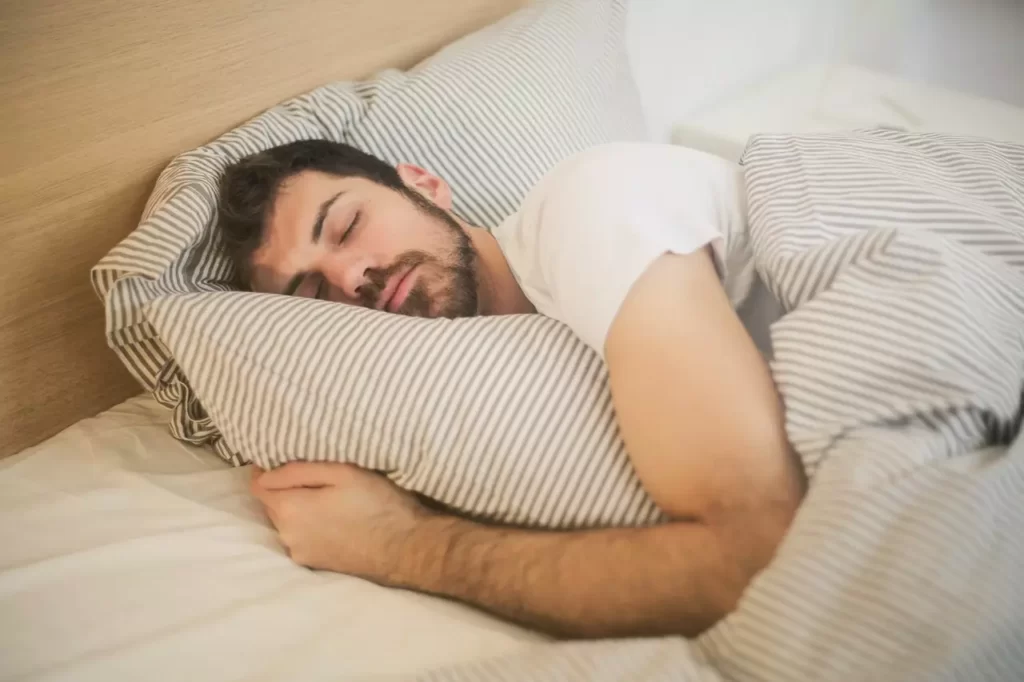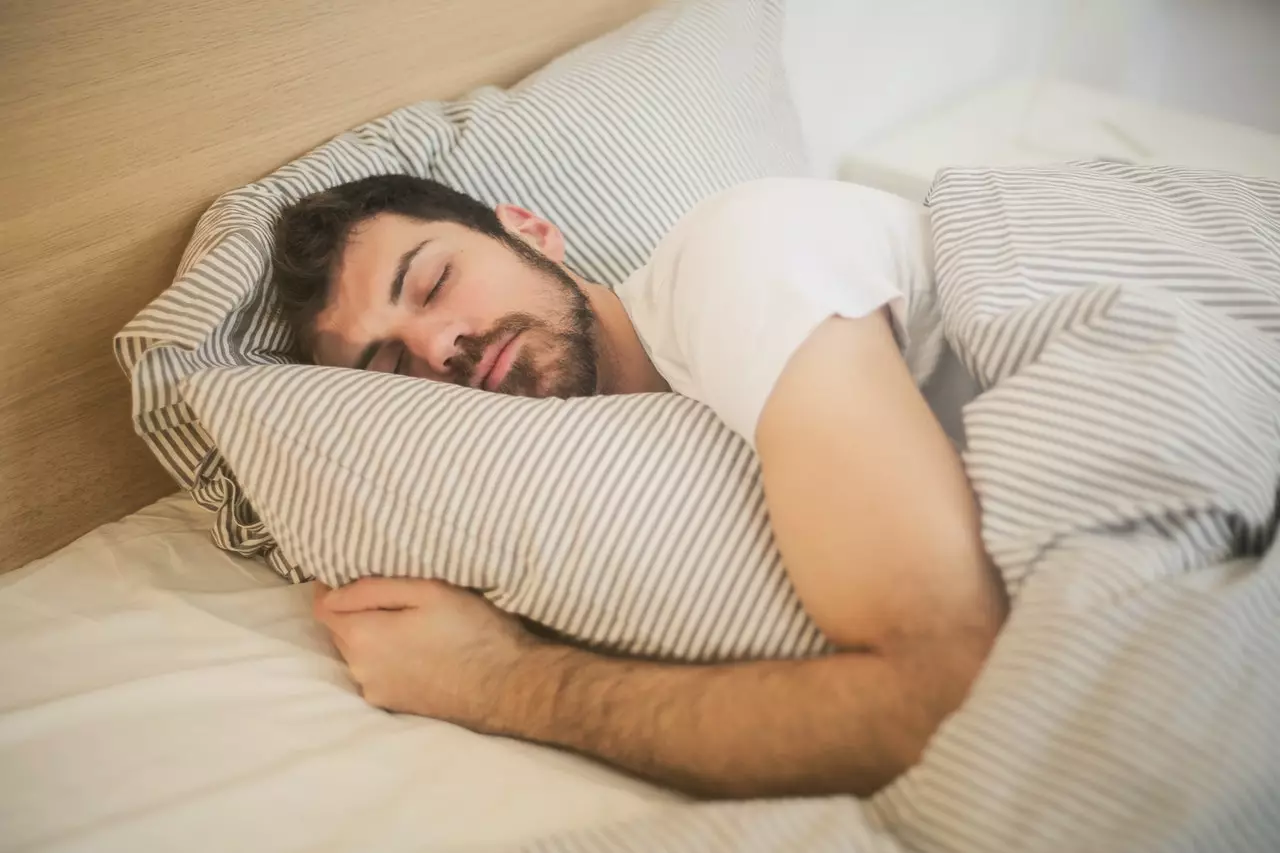Sleeping well is crucial to your well-being. In reality, it’s as vital as eating an appropriate, healthy diet and working out

While rest requirements differ between individuals, however, most adults need between 7 to 9 hours of rest every night. However, as high as 35 per cent of adults living within the United States don’t get enough sleep ( 1Trusted Source, 2Trusted Source).
A lack of sleep could put your safety and health in danger, and that’s why it’s vital to take care of and safeguard your sleep regularly.
This article will give you nine reasons to sleep more.
Table of Contents
1. It can aid in maintaining or losing weight.
Numerous studies have linked the short amount of sleep (defined as sleeping less than 7 hours per night — and a higher risk of weight gain and higher weight index (BMI) ( 3Trusted Source, 4Trusted Source, 5Trusted Source).
A 2010 study showed that those who slept less than 7 hours a night had an astonishing 41% higher likelihood of developing obesity. However, sleeping more did not affect the possibility ( 6Trusted Source).
The effects of sleeping on weight increase are believed to be influenced by various variables, including hormones and the motivation for exercising ( 5Trusted Source).
Sleep deprivation, for instance, boosts the levels of ghrelin and reduces amounts of leptin. Ghrelin is a hormone that causes us to feel hungry, while leptin can make us feel whole. This can cause us to be more hungry and overeat ( 7Trusted Source).
This is backed up by numerous studies that have revealed that those who sleep less are more hungry and are more likely to consume energy ( 8Trusted Source, 9Trusted Source).
In addition, to make up for the low energy levels, nap deprivation can result in craving food items high in sugar and fat because of their higher calories ( 10Trusted Source, 11Trusted Source).
In addition, being tired following a night of too much eye shot could cause you to feel not motivated to go to the gym and walk or engage in any other exercise you like.
Therefore, prioritizing sleep can aid in maintaining healthy body weight.
SUMMARY
A short amount of eye shot is associated with a higher risk of becoming obese and weight growth. Lack of sleep can increase your appetite, which can cause you to consume more calories. Mainly you’re more likely to consume food with a lot of sugar and fat.
2. Improves productivity and concentration
Sleep is crucial for a variety of factors of the brain’s function.

Cognitive ability, concentration performance, productivity and cognition are all affected negatively by lack of sleep ( 12Trusted Source, 13Trusted Source, 14Trusted Source).
A particular study of overworked doctors is a good illustration. The study found that physicians with low, moderate or highly high sleep-related impairments were 54 per cent, 96%, and 97 per cent more likely to have significant medical errors that were clinically important ( 15Trusted Source).
Getting enough rest can boost academic performance for adolescents, children or young adults ( 16Trusted Source, 17Trusted Source, 18Trusted Source, 19Trusted Source).
Additionally, rest-related benefits have been shown to boost the ability to solve problems and improve memory performance, both in adults and children ( 20Trusted Source, 21Trusted Source, 22Trusted Source).
SUMMARY
Napping well can boost the ability to solve problems and improve memory. However, sleep deprivation has been found to hinder the brain’s function and decision-making abilities.
3. Are there ways to maximize athletic performance?
The benefits of taking a nap have been demonstrated to boost the performance of athletes.
Numerous studies have proven that getting enough sleep can boost fine motor abilities such as reaction time, muscle strength, endurance and problem-solving skills ( 23Trusted Source, 24Trusted Source, 25Trusted Source).
In addition, a lack of sleeping can increase the chance of injury and decrease the motivation to work out ( 24Trusted Source).
Resting enough could be the key you require to boost your game to the next stage.
SUMMARY
The benefits of getting enough eye shot have been proven to enhance physical and athletic performance.
4. Will you find strength in your heart?
Sleep quality and length can increase the risk of heart-related disease ( 26Trusted Source, 27Trusted Source, 28Trusted Source).
A study that analyzed 19 studies discovered that sleeping less than 7 hours each day led to an increase of 13% in the risk of dying due to heart diseases ( 29Trusted Source).
Another study found that compared to 7 hours of rest, losing one hour of eye shot was linked to a 6% higher risk of death from all causes of heart attack ( 30Trusted Source).
Additionally, short sleep is believed to increase the risk of having high blood pressure, particularly in people with sleep apnea obstructive, which is a condition characterized by sleep-related breathing interruptions ( 31Trusted Source, 32Trusted Source).
A study showed that those who slept for less than five hours each night were at an increased risk of 61% of getting hypertension than people who rested for seven hours ( 33Trusted Source).
It is interesting to note that excessive nap among adults — longer than 9 hours was also found that increase the likelihood of developing heart health and blood pressure ( 29Trusted Source, 30Trusted Source, 33Trusted Source).
SUMMARY
Sleep schedule that is less than seven hours a night can lead to a higher chance of developing heart disease and hypertension.
5. It affects the sugar metabolism and increases Type 2 diabetes risk
A lack of sleep is associated with the chance of developing Type 2 Diabetes and the condition known as insulin resistance — which occurs when your body can’t utilize insulin as it should ( 34Trusted Source).
A study of 36 studies involving over 1 million people found that taking a nap duration of fewer than 5 hours and asleep time shorter than 6 hours increase the risk for developing Type 2 Diabetes by 48 percentage and 18%, respectively. ( 35Trusted Source).
It’s believed that eye shot deprivation may result in physiological changes such as diminished insulin sensitivity, more significant inflammation and changes in hunger hormones and behavioural changes such as poor decision-making and increased food intake, all of which can increase the risk of developing diabetes ( 36Trusted Source).
Additionally, sleep deprivation is linked with a higher likelihood of becoming overweight, suffering from heart disease, and metabolic syndrome. These triggers increase the chance of developing being diagnosed with diabetes ( 36Trusted Source, 37Trusted Source).
SUMMARY
Numerous studies have demonstrated an enviable link between taking a nap deprivation for a long time and the likelihood of developing Type 2 Diabetes.
6. Sleep problems are connected to depression

Mental health issues like depression are closely connected to sleep problems and sleep disorders ( 38Trusted Source, 39Trusted Source, 40Trusted Source).
A study involving 2,672 people discovered that people suffering from depression or anxiety had a higher likelihood of having lower sleep scores than those who did not suffer from anxiety or depression ( 40Trusted Source).
In another study, those suffering from napping disorders, such as insomnia or sleep apnea that is obstructive, have higher rates of depression than those who don’t ( 41Trusted Source, 42Trusted Source).
If you’re having trouble napping and you notice that your mental health is getting worse, It’s essential to speak with your physician.
SUMMARY
Poor sleep patterns are connected to depression, particularly for those suffering from a sleeping disorder.
7. Helps maintain a healthy immune system
Nap deprivation has been proven to affect immunity ( 43Trusted Source, 44Trusted Source).
According to one research study, people who slept less than 5 hours an evening experienced 4.5 times as likely to get colds than those who slept longer than seven hours. The people who slept for 5-6 minutes were 4.24, many times more susceptible ( 45Trusted Source).
Some studies suggest getting enough sleep can boost your body’s antibodies towards influenza shots ( 46Trusted Source).
Recent research suggests that getting enough rest before and following a COVID-19 vaccine could increase the effectiveness of vaccines. Yet, more research is required to know the possible link ( 47Trusted Source, 48Trusted Source, 49Trusted Source, 50Trusted Source).
SUMMARY
Insisting on at least 7 hours of rest can increase your immunity and aid in fighting the common cold. It can also increase the effectiveness of the COVID-19 vaccine; however, further research is required.
8. Sleeping in is linked to the increase in inflammation
Sleep deprivation can have a significant impact on inflammation throughout the body.
Rest plays a crucial part in the regulation of our central nerve system. In particular, it’s involved in the stress-response systems known as the sympathetic nervous system and the hypothalamic-pituitary-adrenal (HPA) axis (51Trusted Source).
Eye shot loss, particularly from disturbed rest, is believed to trigger inflammation signalling pathways, resulting in higher levels of unfavourable indicators of inflammation, such as interleukin-6 and C-reactive Protein ( 51Trusted Source, 52Trusted Source).
As time passes, chronic inflammation can lead to the development of various chronic diseases, such as heart disease, obesity, and certain types of cancer and Alzheimer’s disease. Depression and Type 2 Diabetes ( 51Trusted Source, 52Trusted Source).
SUMMARY
Sleep problems are connected to increased amounts of inflammation. As time passes, this could increase your chances of developing chronic diseases such as depression, heart disease and Alzheimer’s disease.
9. Influences social interactions and emotions.
The loss of eye shot can affect the ability of your body to manage emotions and interact with others.
When we’re tired, we likely struggle to manage emotional outbursts and our behaviour when we’re in the presence of other people. The fatigue can also impact our ability to react with humour and show compassion ( 53Trusted Source, 54Trusted Source).
Additionally, people who suffer from chronic sleep deprivation tend to withdraw from social gatherings and feel isolated ( 55Trusted Source).
napping more is one of the best ways to improve your relationship with others and assist you in becoming more social.
If you’re dealing with feelings of loneliness or emotional outbursts, Don’t be afraid to talk to a family member or a health professional for support. For more information, check out this list of sources.
SUMMARY
The lack of sleep could affect your social abilities and capacity to manage emotions.
10. A lack of sleep could be risky.
Napping could insufficiently be risky for you and your family members.
If we’re exhausted, the ability to concentrate on our tasks, our reflexes, and our reaction time decrease. Being tired is similar to having consumed a lot of alcohol.
In addition, to be concerned, there is a concern that the Centers for Disease Control and Prevention (CDC) states that one in 25 drivers have been asleep when driving. People who slept less than six hours were more likely to be prone to falling asleep when travelling ( 56Trusted Source).
One study in 2018 revealed that those who slept for 6, 5 or less than 4 hours were at risk of causing a car collision which is 1.3, 1.9, 2.9 and 15.1 times more. The study suggests that the chances of getting into a car accident are significantly increased for every hour you sleep ( 57Trusted Source).
Additionally, it is reported that the CDC states that being awake for longer than 18 hours can be similar to having a blood alcohol level (BAC) that is 0.05 per cent. In 24 hours, the BAC rises to 1.00 per cent, which is more than the legal limit for driving ( 56Trusted Source).
Alongside the increased risk related to driving, a lack of eye shot can also increase the risk of workplace injuries and errors ( 58Trusted Source).
In the end, having a good night’s nap is crucial for safety for all.
SUMMARY
Eye shot deprivation can increase your chance of getting involved in a car crash or getting injured at work. It can significantly impact how you make crucial choices.
It’s the bottom line.
Alongside nutrition and exercise, taking care of your sleep is among the main pillars of good health.
Sleep deprivation is associated with numerous adverse health consequences such as an increased risk of depression, heart disease and swelling, inflammation and illness.
Although each person’s needs are different, most studies suggest that you need between 7 to 9 hours of rest every night to ensure optimal health.
Like you put a premium on your diet and exercise, now is the time to pay sleep the respect it deserves.
For more Healthy Tricks and Tips Check HERE

